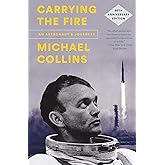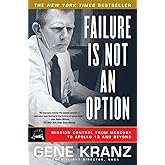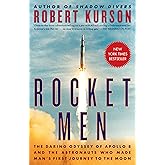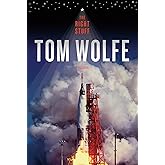
Download the free Kindle app and start reading Kindle books instantly on your smartphone, tablet, or computer - no Kindle device required.
Read instantly on your browser with Kindle for Web.
Using your mobile phone camera - scan the code below and download the Kindle app.



 Audible sample
Audible sample A Man on the Moon Paperback – April 1, 1998

Explore your book, then jump right back to where you left off with Page Flip.
View high quality images that let you zoom in to take a closer look.
Enjoy features only possible in digital – start reading right away, carry your library with you, adjust the font, create shareable notes and highlights, and more.
Discover additional details about the events, people, and places in your book, with Wikipedia integration.
- Print length688 pages
- LanguageEnglish
- PublisherPenguin Books
- Publication dateApril 1, 1998
- Dimensions5.32 x 1.51 x 7.96 inches
- ISBN-100140272011
- ISBN-13978-0140272017
Book recommendations, author interviews, editors' picks, and more. Read it now.
Customers who viewed this item also viewed
Product details
- Publisher : Penguin Books (April 1, 1998)
- Language : English
- Paperback : 688 pages
- ISBN-10 : 0140272011
- ISBN-13 : 978-0140272017
- Item Weight : 1.3 pounds
- Dimensions : 5.32 x 1.51 x 7.96 inches
- Best Sellers Rank: #2,934,477 in Books (See Top 100 in Books)
- #3,964 in Astrophysics & Space Science (Books)
- #110,872 in United States History (Books)
- Customer Reviews:
About the authors

Discover more of the author’s books, see similar authors, read book recommendations and more.

Discover more of the author’s books, see similar authors, read book recommendations and more.

Discover more of the author’s books, see similar authors, read book recommendations and more.
Customer reviews
- 5 star4 star3 star2 star1 star5 star85%11%3%0%0%85%
- 5 star4 star3 star2 star1 star4 star85%11%3%0%0%11%
- 5 star4 star3 star2 star1 star3 star85%11%3%0%0%3%
- 5 star4 star3 star2 star1 star2 star85%11%3%0%0%0%
- 5 star4 star3 star2 star1 star1 star85%11%3%0%0%0%
Customer Reviews, including Product Star Ratings help customers to learn more about the product and decide whether it is the right product for them.
To calculate the overall star rating and percentage breakdown by star, we don’t use a simple average. Instead, our system considers things like how recent a review is and if the reviewer bought the item on Amazon. It also analyzed reviews to verify trustworthiness.
Learn more how customers reviews work on AmazonCustomers say
Customers find the book provides comprehensive coverage of the Apollo program. They describe the history as interesting and epic. The readable style is described as fantastic and well-written. The characters are portrayed as real, flesh-and-blood people. Readers appreciate the engaging pacing and intimate insight into the emotions, experiences, and activities of the crew. Overall, customers find the book entertaining and amusing.
AI-generated from the text of customer reviews
Customers appreciate the book's comprehensive coverage of the space program. They find it a detailed and entertaining history of the manned Apollo missions. The book provides a nice balance of historical information about the program and personal details about the astronauts.
"...general, non-technical reader to get a comprehensive, readable history of the space program, I'd recommend this one...." Read more
"...strength of this book is shown in Chaikin's ability to glean the thoughts and feelings of the astronauts and to write those down both accurately and..." Read more
"...The technical stuff is not super technical, so you don’t have to be an engineer to understand it, but good enough that even engineers (I am one) wo..." Read more
"...A Man on the Moon” delivered in every detail. This book follows closely the astronauts of each mission. They are the key theme...." Read more
Customers enjoy the book's history. They find it interesting, well-researched, and riveting. The book chronicles one of the greatest chapters in our history from the perspective of those who lived it. Readers appreciate the author's ability to not only tell the story but also breathe life into it.
"...jargon (there are other books for that), and he illustrates difficult concepts with archetypes that most readers can relate to...." Read more
"...Apollo 8 was a very daring mission; first men around the moon. Come to find out the Apollo 9 crew passed on it? How could anyone do that?..." Read more
"One of the best historical books I’ve read. It helped me understand the Apollo generation (and my parents)." Read more
"...A satisfying journey through all the Apollo missions with lots of astronaut interviews providing lots of interesting anecdotes that I had mostly..." Read more
Customers find the book easy to read and engaging. They appreciate the clear writing style that draws them in. The book includes the complete text of the original, which is written in a simple enough manner for non-technical readers.
"...enough of the more technical aspects of the story in a simple enough fashion for the non-technical reader to get a decent grounding in these..." Read more
"...He writes like a novelist, presenting only details of interest, focusing on prominent events like Neil Armstrong's first steps on the moon, while..." Read more
"...Well written and mind blowing in scope. The author truly captures the countries single mindedness in its quest to reach the surface of the moon...." Read more
"...This is one of the most fascinating books I've ever read. Andrew's writing is crisp, and clear, and draws you in to the lives of the astronauts..." Read more
Customers appreciate the book's character development. They find it reveals the personalities of those involved and breathes life into them as real, flesh-and-blood people. The book places great emphasis on the brave men who risked everything in order to become memorialized. It also highlights the resolve, intelligence, and fast thinking of the crew and gives a good sense of the tensions felt by both astronauts.
"...Chaikin aptly illustrates the sheer resolve, intelligence, and fast thinking of the crew and ground crews during each mission when things went awry...." Read more
"...It gives a very good sense of the tensions felt by both the astronauts and the ground teams during the flights, and even during the pre-flight..." Read more
"...They are the key theme. The book provides key details into the their character, because the fortitude of what it took to be an astronaut was founded..." Read more
"...Great emphasis on the brave men who risked everything in order to become memorialized in the pantheon of our countries history...." Read more
Customers enjoy the book's pacing. They find it insightful and engaging, providing a unique perspective on astronauts' lives. The book provides an accurate and intimate look at their experiences and emotions.
"...of the astronauts and to write those down both accurately and intimately...." Read more
"...This is a great book - more for the way it shows the inner resoucefulness and cool decision making skills of Borman and Armstrong, and the nearly..." Read more
"...It is compelling, and let's you in on the emotions, experiences and activities of each of the astronauts leading up to the mission and during the..." Read more
"...book relies extensively on astronaut interviews and presents this perspective to the reader...." Read more
Customers find the book entertaining and amusing. They say it's a good introduction and readable.
"...What a highly entertaining, educating, and amusing read!..." Read more
"...this book - it's about the Gemini program that preceded Apollo, is very funny and a good introduction...." Read more
"...Not much. It is a very entertaining and detailed history of the manned Apollo missions and I strongly recommend this book" Read more
"...from the portion I read I can say that this is a very interesting, entertaining, and informative book. I've learned much that I never knew before...." Read more
Customers enjoy the collaboration in the book. They appreciate the real people who made Apollo happen, and the way it goes beyond man and machine to explore the culture at the time.
"...The book also goes beyond man and machine, and dives into the culture at the time. The challenges faced changing public and political opinion...." Read more
"...but also breathing life into the characters, the real people that made project Apollo happen...." Read more
"...Apollo missions--seemed like a hard-working, goal-oriented & magical collaboration!..." Read more
Reviews with images
Best book on the space program !
Top reviews from the United States
There was a problem filtering reviews right now. Please try again later.
- Reviewed in the United States on July 18, 2012I've read a fair number of books on the glory days of NASA's manned space program, from Mercury through Gemini and Apollo, and though this book focuses mostly on the moon landing missions (as should be obvious from the title), when asked which single volume is best for the general, non-technical reader to get a comprehensive, readable history of the space program, I'd recommend this one. The author chose to tell the story AS a story, from the viewpoint of the astronauts involved. People want to read about people, not about machines; they want to get the human side of the story, and that's what this book sets out to tell and it succeeds. At the same time the author presents enough of the more technical aspects of the story in a simple enough fashion for the non-technical reader to get a decent grounding in these aspects.
Like most books written about the Apollo program, even those written by the astronauts and the engineers and technicians and program managers, the book ends on the sad note that the manned exploration of deep space was abandoned at the end of Apollo, almost 40 years ago, and that except for the occasional grandiose plan that never got past the stage of blueprints, there has never been serious consideration of a return to manned exploration of space outside the orbit of Earth.
I was eight years old at the time of Apollo 11, and my memory of the space program goes back only to Apollo 7. I remember, as a kid, being completely riveted by the moon missions, watching every second I could of them on TV, even as the general population lost interest in them, sending away to NASA for their PR kits on each mission (you'd get neat color photos of the crew, stickers of the mission patches, press bulletins, etc.) and clipping and saving moon stories from the newspapers, while speculating with like-minded friends on the future of space exploration (I remember that we couldn't wait until 1981, when we were supposed to be landing on Mars!), only to see our enthusiasm fizzle as NASA was steered into the endless boondoggle of the Shuttle program.
I've since come to regretfully realize that the Moon landing was something of a dead end. This was proven by the unmanned deep space probes of the late 70s and the 80s, when we sent Voyager-2 out scouting the outer planets of the solar system, Saturn, Jupiter, Uranus, Neptune, and their satellites, and confirmed that there wasn't a single other world in our solar system that made a viable destination for a manned space mission. The distances were too great to be reached by any existing technology--even to reach Jupiter would force astronauts to live in a space ship for over 4 years and the space ship itself to carry food, air and other consumables for that same length of time--a complete impossibility even now, decades after the successful moon landings. Then, if the aim is to find another world that could be inhabited and colonized by humans, we'd have to search outside the solar system, in which case, again because of distances, such worlds, if they exist, and if we could find them, could not be reached in the lifetime of any human being, which meant that those astronauts would have to be sent out with no expectation that they would return alive, that they'd have to breed in space and that their offspring would live their entire lives in their space ships, breed again, for generations, for, possibly, thousands of years, in the forlorn hope that we could find such a planet. To even reach another solar system might take the same span of time that, on Earth, stretches from the building of the pyramids to the present day, and even then there's no way of knowing that a habitable planet would exist in that solar system.
No, after the moon, there's no place left to go. We could land on Mars, I guess, but there is no chance of that happening in the lifetime of anyone now living because the will to spend the enormous amount of money it would take to do it does not exist anywhere on the Earth. We could also return to the moon, but even in 1972 people were so bored with moon landings that they'd complain when re-runs of "I Love Lucy" were pre-empted for telecasts from Apollo. The question is, even with these limited missions, who is going to pay for them? Even the scientific community is split, many (it seems to me most) scientist believing that unmanned robot probes are more worthwhile than manned missions. If even scientists doubt the value of humans in space, how can we expect the average citizen to support "Man in Space"?
We have to finally admit that Apollo was the result of a specific set of political circumstances that can never be repeated or recreated. We went to the moon because we wanted to beat the Russians. That is all it was about. All the science and technology that came from the moon program were collateral benefits. We had to beat the Russians. I'm not scoffing at this as a goal. It was important. It was the single most important victory of the cold war. We succeeded in reaching the moon. The Russians tried and failed. They knew how difficult this was, and, if you read the reminiscences of the Russian scientists and technicians and military managers, their respect for American "know how" and ingenuity grew because of our success, to the point that when Reagan announced the so-called "Star Wars" program in the 80s, while the wise guys in the West scoffed at Reagan, the Russians believed we could succeed. Why? Because we managed to land on the moon! In their attempts to keep up with us in our developing Star Wars program, they bankrupted the Soviet Union. The success of Apollo and the prestige this success lent to US science, technology and industry was one of the main factors in the collapse of the USSR.
The irony is that while during the Moon missions, pundits spoke of how "500 years from now, everything else about our civilization will be forgotten, but the one thing we'll be remembered for is landing on the Moon", now, only 40 years later, many people don't believe we did. They think it was a hoax! Sometimes we hear the suggestion that we should go back to the moon just to prove we were actually there once before, to prove it to the hoax theorists, but who's going to spend that kind of money to convince a cult of knuckle-dragging imbeciles whose noisy opinions are of little importance to anyone living in the world of reality? No, let's accept Apollo for what it was--a successful bid for international political prestige during a period of conflict which, because of the existence of thermonuclear weapons, couldn't be settled by war. It was a program established to fulfill national goals that no longer exist. And a return to lunar exploration, or a manned mission to Mars, will never take place until it is once again a matter of equal importance to the survival of a political system involved in a deadly rivalry, a struggle for survival, against an implacably hostile political enemy. It's hard to imagine such a circumstance arising today, but it may in the future.
- Reviewed in the United States on February 14, 2014One cannot overstate the importance of Andrew Chaikin's book on the Apollo program. Many years in the making, Chaikin took the time to track down and interview nearly all of the 24 astronauts who flew to the moon during project Apollo (I believe the only person he missed was Jack Swiegert, Apollo 13's command module pilot, who passed away in 1982 before writing this book). On top of the astronauts themselves, Chaikin spent time interviewing individuals who didn't fly these missions, but who were equally important to its success.
The book is largely written chronologically, beginning with the tragedy of Apollo 1. Background information on projects Mercury and Gemini aren't required to enjoy this book, and when required, Chaikin does a marvelous job of bringing forward events prior to Apollo to move the book along smoothly. Each manned mission is covered in about as much detail as possible, with the exceptions of maybe Apollo 7 (which never went to the moon, but was a test of the command/service modules in earth orbit), or Apollo 9 (an earth orbit test of the CSM and lunar modules). References are drawn to these two missions where necessary, but they do not receive the in-depth treatment each of the others receives. What stood out to me, which I never knew before reading this book, was the number of mechanical difficulties encountered along the way, and how many times the mission commander would be ready to abort before a solution was reached. Chaikin aptly illustrates the sheer resolve, intelligence, and fast thinking of the crew and ground crews during each mission when things went awry. So the book presents the reader with actual life or death cliffhangers or obstacles to a successful mission, and it makes for excellent reading.
I was also impressed with Chaikin's ability to explain how things in space, in orbit, in a rocket engine, in a volcano, or on the moon (ad infinitum) actually WORK. He doesn't overwhelm the reader with technical jargon (there are other books for that), and he illustrates difficult concepts with archetypes that most readers can relate to. One example comes to mind in how he described Buzz Aldrin's doctoral dissertation on orbital rendezvous techniques, and how this allowed Buzz to discuss "counter-intuitive maneuvers" to the other astronauts. Chaikin is a master of explaining things so anyone can understand.
Another strength of this book is shown in Chaikin's ability to glean the thoughts and feelings of the astronauts and to write those down both accurately and intimately. With each turn of the page, I felt I knew the astronauts like one of their peers. I could feel Frank Borman's intense aversion to take risks the first time circling the moon, Armstrong's technical expertise and grace under pressure in looking for an adequate landing spot, Pete Conrad's virtual "kid in a candy store" excitement en route to the moon, Jim Lovell's dismay when his mission was lost, Al Shepard's tears of joy as he stepped off the LM, Dave Scott's excitement in commanding the first J-mission, John Young's remorse at snapping the ALSEP power cable, Jack Schmitt's struggles to be the first scientist to fly to the moon (and Joe Engle's resentment as a result), and Gene Cernan's prophetic final words as the last moonwalker (for the time being). In a word, Chaikin takes you along for each mission, and you will feel as if you are right there working alongside the astronauts.
This book was much better than I ever expected. I found myself racing home from work each day to read it, and despite its massive size (over 500 pages), it felt like a quick, engaging read. Chaikin has done a wonderful service to the history of NASA and the Apollo missions. If I had to choose an authoritative, quintessential text on lunar exploration, this is book is where it all starts, and where it all ends.
- Reviewed in the United States on October 16, 2024I’m only about 20% of the way through, but I am REALLY liking it. It gives you both human interest about the astronauts and their families, as well as pretty good technical information about the space program. The technical stuff is not super technical, so you don’t have to be an engineer to understand it, but good enough that even engineers (I am one) won’t be bored. It gives a very good sense of the tensions felt by both the astronauts and the ground teams during the flights, and even during the pre-flight simulations. I really ended up appreciating the amount of preparation needed for the space flights. Yeah, I knew they didn’t just fly by the seat of their pants, but the sheer magnitude of the preparations was staggering.
Top reviews from other countries
 PlumR14Reviewed in the United Kingdom on May 12, 2024
PlumR14Reviewed in the United Kingdom on May 12, 20245.0 out of 5 stars superb
As a young person brought up in the late 50’s, this book provides an excellent record of the triumphs and achievements, sadly with the disasters, personal and technical, which became a part of the Apollo programme.
 MarquiniusReviewed in the Netherlands on December 14, 2022
MarquiniusReviewed in the Netherlands on December 14, 20225.0 out of 5 stars a perfect read
I am biased, having been woken by my mother to watch the first landing. Middle off the night, 11 years old, black an white tv. Never cleared my brain.
But this book tells the complete story, including the deeper feelings and thoughts of the people going through it all. And what a tale to tell.
The best feeling after having finished this extremely well written book? We’re close to sending people back to the moon. Good on the Apollo astronauts pointing the way.
 GRReviewed in Canada on September 23, 2019
GRReviewed in Canada on September 23, 20195.0 out of 5 stars Thrilling!
The detail of this book takes you right back to the events like you were there watching them again. Very well written with accurate information that came right from the people who worked on the project. A must read for any anyone who lived and breathed the Apollo program as a kid.
-
 MarcioReviewed in Brazil on September 23, 2019
MarcioReviewed in Brazil on September 23, 20195.0 out of 5 stars Que livro bom!
Encarar 580 páginas em inglês não é fácil, mas este livro é tão bom que quando acabou, desejei que estivesse apenas na metade. O autor conta a história das missões Apollo em detalhes. A leitura é um imenso prazer para quem gosta do assunto. Se o autor escrevesse outro volume sobre as missões Mercury e Gemini, eu não teria dúvidas em lê-lo também. A minissérie "From the Earth to the Moon" da HBO é parcialmente baseada neste livro. É um livro muito bacana. 580 páginas que valem qualquer esforço para uma leitura em inglês. Muito, muito bacana!
-
 MimiReviewed in France on December 15, 2020
MimiReviewed in France on December 15, 20205.0 out of 5 stars Passionnant !
Livre très bien écrit qui nous fait rentrer dans les aventures Apollo, même si l'on est profane comme moi !
Les passages techniques sont un peu difficiles parfois, mais franchement je n'ai jamais eu envie d'arrêter ma lecture. On trouve des anecdotes sur chaque voyage. Un bémol : les photos au centre du livre auraient mérité un papier glacé.
La couverture est un peu fragile car recouverte d'une fine pellicule qui donne un toucher "peau de pêche" très doux, très agréable, mais cette pellicule a tendance à se décoller sur les bords du livre au fil de la manipulation, et pourtant je suis très soigneuse. C'est dommage car je compte bien garder ce livre en bonne place dans ma bibliothèque, tant il m'a plu !!




















